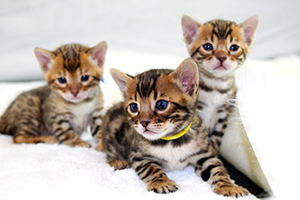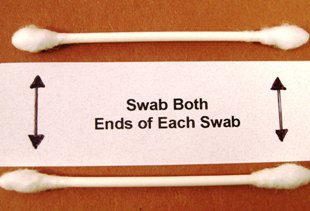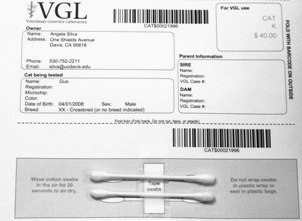Quick Summary
Click here for Price and Turnaround Time
Phenotype: Cats affected with this rare form of early-onset blindness have retarded development and degeneration of photoreceptor cells, which leads to blindness by 7 weeks of age.
Mode of Inheritance: Autosomal dominant
Alleles: N = Normal, Rdy = Progressive retinal atrophy (CRX mutation-associated)
Breeds appropriate for testing: Abyssinian, Somali
Explanation of Results:
- Cats with N/N genotype will not have CRX/Rdy progressive retinal atrophy and cannot transmit this progressive retinal atrophy variant to their offspring.
- Cats with N/Rdy genotype will have CRX/Rdy progressive retinal atrophy, an untreatable condition leading to early-onset blindness. They will transmit this progressive retinal atrophy variant to 50% of their offspring. Matings between two N/Rdy cats are predicted to produce 75% kittens affected by this CRX/Rdy form of progressive retinal atrophy.
- Cats with Rdy/Rdy genotype will have CRX/Rdy progressive retinal atrophy, an untreatable condition leading to early-onset blindness. They will transmit this progressive retinal atrophy variant to all of their offspring.
$44 one test per animal
Also available as part of the following packages:
- $66 this test + PRA rdAc test OR PK Deficiency Test (Abyssinian, Somali, and domestic shorthair)
- $88 this test + PRA rdAc test + PK Deficiency Test (Abyssinian, Somali, and domestic shorthair)
Cat DNA tests are carried out using cells brushed from your cat's cheeks and gums using household cotton swabs.
The cat DNA submission form with instructions and a place to tape the cotton swabs is sent to you via email after you place an order, and can be printed from your home computer. DNA test kits are no longer mailed.
Instructions
Step-By-Step:
1.
 Purchase regular household cotton swabs for cat DNA collection (the cotton swabs can be purchased at a pharmacy or drug store)
Purchase regular household cotton swabs for cat DNA collection (the cotton swabs can be purchased at a pharmacy or drug store)
2.

Make sure the cat has not had anything to eat or drink for at least 1 hour prior to collecting sample.
When swabbing kittens, isolate each kitten from the mother, littermates and any shared toys for 1 hour prior to swabbing. Kittens should not have nursed or eaten for 1 hour prior to collecting sample.
If collecting samples from more than one cat, make sure to sample one cat at a time and wash your hands before swabbing another cat.
3.
 Use both ends of the two cotton swabs for a total of four swabs.
Use both ends of the two cotton swabs for a total of four swabs.
4.
Place the cotton head of the swab between the cat’s gums and cheek and rub or rotate the swab back and forth for 15 seconds. Repeat with each cotton swab head, for a total of 4 swabs. We recommend swabbing a different area of the gums with each swab head.
5.
Wave the swab in the air for 10-15 seconds to air dry it before attaching it to the submission form.
6.
 After swabbing the cheek and gums, tape the cotton swabs to the bar-coded submission form printed from your MyVGL account.
After swabbing the cheek and gums, tape the cotton swabs to the bar-coded submission form printed from your MyVGL account.
ATTENTION:
- Do not collect saliva/drool – the key to obtaining a good sample is getting cheek cells on the swab.
- Do not rub swab on the cat’s tongue or teeth – this will result in poor quality sample.
- Do not collect a sample from a kitten that has recently nursed – the mother’s genetic material can rub off on the kitten’s mouth and contaminate the sample.
A form of blindness called “rod cone dysplasia”, or “Rdy” has been identified in Abyssinian and Somali cats. This progressive retinal atrophy differs from the "rdAc" (CEP290 mutation) progressive retinal atrophy. The mutation underlying "Rdy" is a single base pair deletion in a different gene, CRX, which results in a defective protein that is critical for eye development. Cats carrying one copy of this mutation have retarded development and degeneration of photoreceptor cells, which leads to early-onset blindness by 7 weeks of age. Current information suggests that the “Rdy” mutation is restricted to the Abyssinian and Somali breeds. The “Rdy” mutation is inherited as a dominant trait: cats that have one or two copies of the mutation will be affected. The Rdy mutation is rare.
To assist owners and breeders in identifying affected and carrier cats, the VGL offers DNA tests for the two mutations known to cause the two different forms of PRA in cats - rdAc (CEP290) and Rdy (CRX). Breeders can use these tests as tools to avoid breeding two carriers of rdAc which would produce 25% affected offspring, or to test for the presence of “Rdy” in the CRX gene of suspected affected cats.
Since both forms of blindness are found in the Abyssinian breed, all associated breeds may have a concern for these diseases. A novel form of blindness occurs in the Bengal cat, and a separate causative mutation has been identified (a genetic test for the Bengal-specific PRA is available here). However, since Bengal cats have had Abyssinian breedings in their ancestry, genetic testing for rdAc and Rdy may also be warranted in some Bengal lines.
